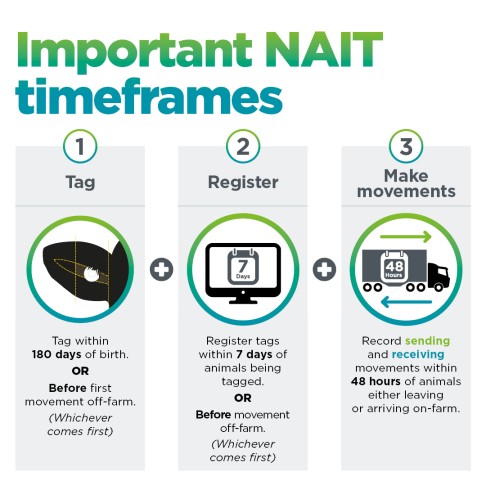NAIT accreditation set for relaunch
The new, improved NAIT accreditation programme is open to applicants from Monday, March 28. This is expected to improve the standard of service providers who manage NAIT accounts on behalf of farmers.
We will be notifying current accredited organisations of the requirement to reapply for NAIT accreditation in the coming months. Farmers are encouraged to speak with their provider in the meantime and to consider future options in the event their current provider decides not to reapply or is unable to gain NAIT accreditation.
NAIT Limited defers a decision to increase levies to further consider submissions received
NAIT Limited closed consultation with farmers and collection agents on proposed increases to NAIT levies on Friday 25 February 2022. A total of 147 submissions were made with a mix of submitters, including levy payers, primary sector groups and collection agents.
While not everyone supported the proposed increase in levies, the overall sentiment from the submissions is a reluctant acceptance of the need to increase funding to improve the system, and that NAIT Ltd needs to deliver on their commitments to create a user-friendly and effective system. However, based on the submissions received, the Board of NAIT Limited has decided to defer any decision on NAIT Levies to 19 May 2022 to allow for a comprehensive review of feedback.
Kevin Forward, Head of Traceability says of the move to defer the decision on levy increases:
‘OSPRI is determined to get better at listening to the farmers and industries we service. The purpose of this consultation was to hear and consider the feedback from levy payers before making any decisions.’
‘Based on feedback, the NAIT Board has decided to defer the decision on increasing levies to further consider the submissions received. I believe this shows our commitment to genuinely engage with levy payers on the proposal’.
Buying or selling beef weaner calves?
Check out this simple checklist to follow to ensure you maintain lifetime traceability of your animals.
Incorporating good traceability practices into your day-to-day management is a great habit to develop. It helps protect your farm and livelihood in the event of a disease outbreak and reduces the chances of you not meeting your legal obligations and any associated fines or prosecutions for non-compliance.
Successful aerial operation in the Tararua Ranges
Alongside DOC we have successfully completed our first pest control aerial operation in the Northern Tararua Ranges over the weekend, covering an area of 32,750 hectares.
This is a significant achievement as it means the entire Tararua Ranges, covering an area of close to 70,000 hectares has now been treated with 1080.
While it’s been a long time since the nearby Kāpiti Coast had bovine TB, Te Horo farmer Kerry Walker still remembers with a grimace what it was like when TB came to his farm some 30 years ago.
Hunters advised not to release deer into new regions
Ahead of the hunting season kicking we're asking hunters to think again if they are considering illegally releasing and relocating deer into new areas.
Deer hunters can unintentionally spread bovine TB by moving or releasing deer from one area to another area. Over the years OSPRI has worked hard to eradicate TB in possums from large areas of New Zealand. This work can all be undone by the reintroduction of TB infected deer with the potential of spill back of infection into the possum population.
 Important NAIT timeframes
Important NAIT timeframes
Understanding your NAIT obligations is the first step to maintaining lifetime traceability of your animals. When we improve NAIT compliance we can maintain the integrity and accuracy of the data stored in the NAIT system. This will mean we can respond quickly and efficiently if another disease hits New Zealand livestock.
Just because you have not had a disease outbreak on your farm, does not mean you do not have a risk now or in the future, everyone has a part to play in protecting our livestock.

